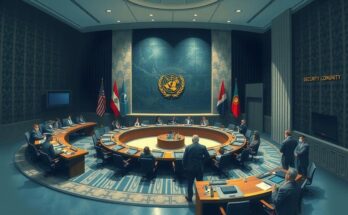Sudan and Somalia have rejected US requests regarding the resettlement of Palestinians displaced by Trump’s Gaza plan, emphasizing humanitarian and legal concerns. Despite efforts from the US and Israel to proceed, both nations maintain their commitment to Palestinian rights amidst regional instability.
Sudanese officials have formally rejected a request from the United States to discuss the potential resettlement of Palestinians displaced from Gaza, as proposed under Donald Trump’s plan to transform the region into a Mediterranean leisure hub. The US and Israel reportedly initiated discussions with Sudan, Somalia, and Somaliland regarding this matter. These efforts are seen as part of the larger strategy to implement Trump’s proposals despite widespread opposition and significant logistical challenges.
Two Sudanese officials confirmed that the discussions about hosting Palestinians began prior to Trump’s presidency. The officials noted that the appeals included military support for Sudan’s ongoing conflicts, particularly against the paramilitary Rapid Support Forces, coupled with other incentives. However, the Sudanese government firmly rejected these overtures, with one official stating, “This suggestion was immediately rebuffed.”
Somalia has also replied negatively to similar requests, with its foreign minister asserting that any plan jeopardizing the rights of the Palestinian people to live on their ancestral land would not be permitted. Under Trump’s framework, Gaza’s population of over two million is envisioned to be permanently displaced to create a high-end international destination. Experts assert that any forced relocation would violate international law.
Despite Egypt and Jordan being initially flagged as potential resettlement countries, both nations vocally opposed the plan. Palestinians in Gaza have expressed outright rejection of the proposal, disputing any claims of voluntary emigration. An alternative reconstruction initiative put forth by Arab states intends to keep Palestinians in their homeland while facilitating rebuilding efforts.
The White House has reiterated Trump’s support for his vision for Gaza amidst these unfolding discussions. Reports indicate that US and Israeli officials have attempted contact with Somalia and Somaliland, emphasizing the ambiguity surrounding the progress and level of these discussions. Reaction to these initiatives from Israeli leadership, including Prime Minister Benjamin Netanyahu, has been one of endorsement, labeling the proposal as a “bold vision.” Yet, legal scholars contend that any forced migration under the current humanitarian crisis could be unlawful, potentially qualifying as a war crime.
After normalizing relations with Israel in 2020, Sudan was subsequently ravaged by civil war and humanitarian catastrophes. The US sought to incentivize Sudan’s involvement, all while being cautious of endorsing a faction implicated in war crimes. General Abdel Fattah al-Burhan, Sudan’s de facto president, recently affirmed the country’s categorical rejection of any plans involving the resettlement of Palestinians.
In Somaliland, over three million inhabitants have not received any formal proposals for resettlement discussions regarding Palestinians. An anonymous official within Somaliland expressed non-involvement in any such negotiations. Somalia, a traditional supporter of Palestinian rights, has also stated that it was not approached and remains committed to assisting the Palestinian cause amidst growing cooperation with Arab nations and Turkey. The ongoing rule of al-Shabaab further complicates Somalia’s domestic stability concerning foreign policy decisions.
In summary, both Sudan and Somalia have decisively rejected proposals from the United States regarding the resettlement of Palestinians from Gaza under Trump’s plan. These refusals underscore a shared commitment to Palestinian rights and territorial integrity amid significant geopolitical challenges. The international community and legal experts continue to contest the legality of any forced relocation, emphasizing the need for humane and lawful solutions to the ongoing crisis in Gaza.
Original Source: www.theguardian.com




